|
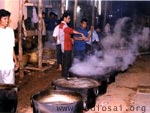 By
now, the Village Service work was falling into some kind of
a pattern. Every evening after Bhajans, some of the
teachers from the University would do the sorting of the clothes
for the distribution and plan the loading operations. The
clothes were all stored in the Poornachandra Hall [there was
no other closed space big enough to store them all!], and
it had the look of a warehouse, with trucks lining up one
after another for loading! Other teachers would be engaged
in logistic planning, based on the information collected.
Vehicles were deployed as required. Student volunteers and
teachers were given the necessary instructions and briefing,
including route maps etc. Back-up and fall-back arrangements
also were organised. After dinner, the kitchen-operations
would be in full swing, and as things got ready, the lady
teachers and the girl students of the Anantapur Campus would
start the packing, preparing food packets in thousands, sometimes
sitting all night. By 5 A.M., all the trucks would line up
near the North Indian canteen, the final loading point. Huge
crates containing food packets would be loaded into them one
by one. Some of the trucks would carry both food and clothes.
Many tractor-trailers also were pressed into service. At 6
A.M., the loading operations would be temporarily suspended
so that everyone could assemble for morning Darshan. By
now, the Village Service work was falling into some kind of
a pattern. Every evening after Bhajans, some of the
teachers from the University would do the sorting of the clothes
for the distribution and plan the loading operations. The
clothes were all stored in the Poornachandra Hall [there was
no other closed space big enough to store them all!], and
it had the look of a warehouse, with trucks lining up one
after another for loading! Other teachers would be engaged
in logistic planning, based on the information collected.
Vehicles were deployed as required. Student volunteers and
teachers were given the necessary instructions and briefing,
including route maps etc. Back-up and fall-back arrangements
also were organised. After dinner, the kitchen-operations
would be in full swing, and as things got ready, the lady
teachers and the girl students of the Anantapur Campus would
start the packing, preparing food packets in thousands, sometimes
sitting all night. By 5 A.M., all the trucks would line up
near the North Indian canteen, the final loading point. Huge
crates containing food packets would be loaded into them one
by one. Some of the trucks would carry both food and clothes.
Many tractor-trailers also were pressed into service. At 6
A.M., the loading operations would be temporarily suspended
so that everyone could assemble for morning Darshan.
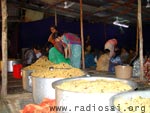 Swami
would come out at about quarter-to-seven, slowly walking past
the ladies and the gents. He would then go to the veranda,
have a word or two with the Mr. Narasimha Murthy, Warden of
the Brindavan Hostel. The Warden would then seek Swami's permission
and Blessings. That would be the signal for all the boys to
rise. Marching in rows of three, the entire group of teachers
and boys (including of the Higher Secondary School) would
commence their circumambulation of the Mandir, one group chanting
Vedas and the other group singing Bhajans. After all the students
and teachers have left the Sai Kulwant Hall, some senior devotees
in the veranda would rise to seek Swami's Blessings and they
too would come out to get ready for service. The idea of doing
service had now become infectious, and many elderly devotees
eagerly sought Baba's permission to join the students and
contribute their bit. By around eight A.M., the trucks and
the tractors would start rolling out, with boys singing Bhajans
and shouting Jai! Over a thousand people went for service
every day. Elders would accompany in cars, vans and jeeps,
while two mobile squads equipped with wireless would also
leave to provide mobile co-ordination as needed. To make sure
that no time is lost, all vehicles were required to be refuelled
the previous evening itself. Swami
would come out at about quarter-to-seven, slowly walking past
the ladies and the gents. He would then go to the veranda,
have a word or two with the Mr. Narasimha Murthy, Warden of
the Brindavan Hostel. The Warden would then seek Swami's permission
and Blessings. That would be the signal for all the boys to
rise. Marching in rows of three, the entire group of teachers
and boys (including of the Higher Secondary School) would
commence their circumambulation of the Mandir, one group chanting
Vedas and the other group singing Bhajans. After all the students
and teachers have left the Sai Kulwant Hall, some senior devotees
in the veranda would rise to seek Swami's Blessings and they
too would come out to get ready for service. The idea of doing
service had now become infectious, and many elderly devotees
eagerly sought Baba's permission to join the students and
contribute their bit. By around eight A.M., the trucks and
the tractors would start rolling out, with boys singing Bhajans
and shouting Jai! Over a thousand people went for service
every day. Elders would accompany in cars, vans and jeeps,
while two mobile squads equipped with wireless would also
leave to provide mobile co-ordination as needed. To make sure
that no time is lost, all vehicles were required to be refuelled
the previous evening itself.
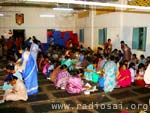 One
of the elders merits special mention. He is Mr. Chiranjeevi
Rao. Often described as Swami's shadow in Prasanthi Nilayam,
he was specially deputed by Swami to make sure that people
in all the villages visited were happy, that no deserving
person was missed out for any reason whatsoever, that everything
went smoothly, and that all the students ate at the appointed
hour. Every evening, he had to personally report to Baba that
people in all the villages visited were content. As a part
of his responsibility, Mr. Rao also took upon himself to give
fatherly advice and guidance as required, and do trouble-shooting
if necessary. He knew this region like the back of his hand,
and also the village elders in some of the bigger villages.
Even so, it was a towering assignment for one pushing eighty-one
and with a medical history behind. But when one works for
Swami, He gives all the required strength. This was very evident
from the way Mr. Rao exerted himself without a moment of rest,
from eight in the morning to about three O'clock in the afternoon,
sometimes up to four, or even six O'clock. He took particular
care to oversee operations in the so-called "difficult"
centres, where there were large crowds due to high expectations.
In one place, food supply might be in excess while in another
place it would be running short. Taking advantage of wireless
contacts, Mr. Rao would see to it that there was the required
redistribution so that the glitch was overcome. One
of the elders merits special mention. He is Mr. Chiranjeevi
Rao. Often described as Swami's shadow in Prasanthi Nilayam,
he was specially deputed by Swami to make sure that people
in all the villages visited were happy, that no deserving
person was missed out for any reason whatsoever, that everything
went smoothly, and that all the students ate at the appointed
hour. Every evening, he had to personally report to Baba that
people in all the villages visited were content. As a part
of his responsibility, Mr. Rao also took upon himself to give
fatherly advice and guidance as required, and do trouble-shooting
if necessary. He knew this region like the back of his hand,
and also the village elders in some of the bigger villages.
Even so, it was a towering assignment for one pushing eighty-one
and with a medical history behind. But when one works for
Swami, He gives all the required strength. This was very evident
from the way Mr. Rao exerted himself without a moment of rest,
from eight in the morning to about three O'clock in the afternoon,
sometimes up to four, or even six O'clock. He took particular
care to oversee operations in the so-called "difficult"
centres, where there were large crowds due to high expectations.
In one place, food supply might be in excess while in another
place it would be running short. Taking advantage of wireless
contacts, Mr. Rao would see to it that there was the required
redistribution so that the glitch was overcome.
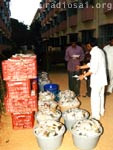 When
others were winding up operations and preparing to return
to Puttaparthi, Mr. Chiranjeevi Rao would still be going round
from village to village, personally checking that all the
deserving poor had been given food and clothes. If he felt
that some people had been inadvertently left out, he would
make amends on the spot. In many villages, he would call on
the local elders and seek their help if required. This was
also good public relations! He would make sure that when he
left, everyone was pleased with the attention they had received.
He would go to any length of trouble just to make sure that
everyone was happy. As if all this was not enough, he would,
during his movements, stop by the roadside and distribute
food and clothing to farm workers, whenever he found a deserving
person [it was the ground-nut harvest season, and many people
were busy in the fields]. One day he heard at about two O'clock
that in a village some distance away, there were hundreds
of migrant farm workers who had come in search of jobs, from
as far away as seven hundred kilometres. Mr. Rao tirelessly
tracked them down and made them all happy. While he would
sternly admonish students and teachers if they did not eat
their lunch promptly [as per Swami's instructions], he himself
would be busy working. Only after repeated pleas by those
accompanying him would he agree to stop his vehicle near a
shady tree and hurriedly gulp a few morsels of food, by the
roadside. The way he insisted on meticulously complying with
each and every instruction of Swami, was an object lesson
to all that observed him. When
others were winding up operations and preparing to return
to Puttaparthi, Mr. Chiranjeevi Rao would still be going round
from village to village, personally checking that all the
deserving poor had been given food and clothes. If he felt
that some people had been inadvertently left out, he would
make amends on the spot. In many villages, he would call on
the local elders and seek their help if required. This was
also good public relations! He would make sure that when he
left, everyone was pleased with the attention they had received.
He would go to any length of trouble just to make sure that
everyone was happy. As if all this was not enough, he would,
during his movements, stop by the roadside and distribute
food and clothing to farm workers, whenever he found a deserving
person [it was the ground-nut harvest season, and many people
were busy in the fields]. One day he heard at about two O'clock
that in a village some distance away, there were hundreds
of migrant farm workers who had come in search of jobs, from
as far away as seven hundred kilometres. Mr. Rao tirelessly
tracked them down and made them all happy. While he would
sternly admonish students and teachers if they did not eat
their lunch promptly [as per Swami's instructions], he himself
would be busy working. Only after repeated pleas by those
accompanying him would he agree to stop his vehicle near a
shady tree and hurriedly gulp a few morsels of food, by the
roadside. The way he insisted on meticulously complying with
each and every instruction of Swami, was an object lesson
to all that observed him.
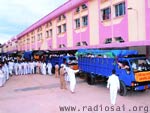 To
get back to the main story, after leaving Prasanthi Nilayam,
the convoy, made up of trucks, tractor-trailers, wireless-equipped
monitoring jeeps, vans, and the cars carrying the elders,
would head towards the target area for the day. Mr. Chiranjeevi
Rao would form the rear-guard, having made sure that the 'launch'
was smooth. En route, the boys would be singing Bhajans, and
in many places people standing on the roadside, especially
children, would cheer, wave hands, and greet by shouting "Sai
Ram!" On approaching the designated area, the different
service teams would peel off to their respective destinations.
The unwritten rule was that to the extent possible food service
should begin by 9 A.M. To meet this requirement, in a few
cases the food trucks would leave early, sometimes as early
as 5 A.M. Despite this, in one instance, the truck could reach
the designated village only by around 10.30 A.M, though the
village was only 35 kilometres away - that in itself is a
sufficient commentary on how bad the roads [where they existed!]
were. To
get back to the main story, after leaving Prasanthi Nilayam,
the convoy, made up of trucks, tractor-trailers, wireless-equipped
monitoring jeeps, vans, and the cars carrying the elders,
would head towards the target area for the day. Mr. Chiranjeevi
Rao would form the rear-guard, having made sure that the 'launch'
was smooth. En route, the boys would be singing Bhajans, and
in many places people standing on the roadside, especially
children, would cheer, wave hands, and greet by shouting "Sai
Ram!" On approaching the designated area, the different
service teams would peel off to their respective destinations.
The unwritten rule was that to the extent possible food service
should begin by 9 A.M. To meet this requirement, in a few
cases the food trucks would leave early, sometimes as early
as 5 A.M. Despite this, in one instance, the truck could reach
the designated village only by around 10.30 A.M, though the
village was only 35 kilometres away - that in itself is a
sufficient commentary on how bad the roads [where they existed!]
were.
In every village, the students would park the truck at a
central spot and then go round a few streets singing Bhajans.
After this Nagarsankeertan, the Prasadam distribution
would start in right earnest. Unloading the food baskets from
the truck, boys in threes and fours would go from hut to hut,
door to door, and distribute Prasadam. When the food
basket became empty, they would come back to the truck for
a refill. Even isolated houses were covered. Swami often arranges
for the distribution of Prasadam in Prasanthi Nilayam,
and while the distribution is in progress, He always moves
around, doing spot checks, "Did you receive Prasadam?"
This is in the Indian tradition.While doing village service,
the boys did not forget the example set by Baba. While some
were serving, others would do checks just to make sure that
no one was left out.
|